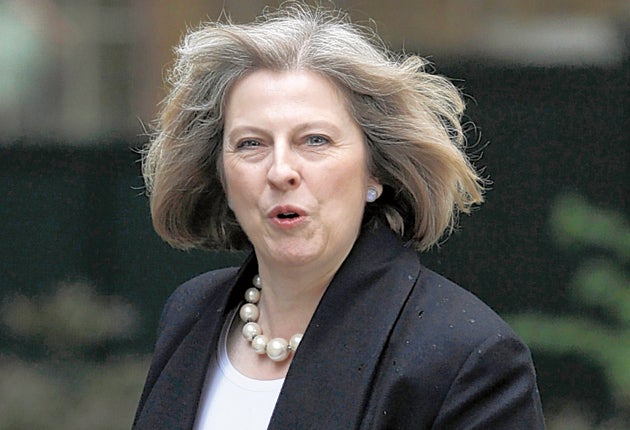Theresa May is surprise choice to be Home Secretary

Theresa May's elevation as Britain's second female Home Secretary was the most eye-catching appointment to the first coalition government since the Second World War.
The team assembled by David Cameron and Nick Clegg, which meets today, brings together former political foes around the Cabinet table just over a week after they were trading blows in the general election campaign.
Mr Cameron said the two parties would be working "hand in hand" at every level as the new coalition sought to create a "new politics". But for all its novelty, in other ways the Cabinet appeared a throwback to an earlier political age: its seats were mainly filled by white men educated at public schools and Oxbridge.
Mrs May's appointment to one of the biggest jobs in government – three years after Jacqui Smith became the first female Home Secretary – was the most high-profile exception. It was a reward for 13 years' service on the Tory frontbench, most recently as shadow Work and Pensions Secretary.
Mrs May, who also became Minister for Women and Equalities, insisted the number of female ministers would soar over the next five years.
"David Cameron has made it clear that his aspiration by the end of the Parliament would be that a third of ministerial appointments would be women," she told BBC Radio 4.
Sitting alongside the Liberal Democrats will come as a particular wrench to Mrs May: five years ago the party fought a highly personal campaign to oust her as the MP for Maidenhead. In addition to Mr Clegg, the Liberal Democrats will fill four Cabinet posts, as well as about 15 more junior ministerial jobs, with a Liberal Democrat sitting in every Whitehall department.
The key economic portfolios of Chief Secretary to the Treasury and Business Secretary went to David Laws and Vince Cable respectively.
That will give Mr Laws, a former banker, a central role in drawing up the spending cuts and tax rises required to slash this year's record £163bn deficit. He will have to work with George Osborne, the Chancellor, in administering the unpalatable medicine.
Dr Cable, who is also deputy Liberal Democrat leader, will also take charge of the drive to reform the financial system. The other Liberal Democrats in the Cabinet are Chris Huhne as Energy and Climate Change Secretary and Danny Alexander as Scottish Secretary.
The arrival of five Liberal Democrats in the top team meant disappointment for several Conservatives who would have expected Cabinet posts.
Mr Cameron's most trusted allies were installed in the departments they shadowed in opposition. William Hague, his unofficial deputy, became Foreign Secretary. He also receives the title of First Secretary of State that was revived for Lord Mandelson last year
Mr Hague will waste little time before embarking on his first overseas trip, announcing yesterday that he is to travel to Washington tomorrow for talks with US Secretary of State Hillary Clinton. The Foreign Office said Mr Hague had been invited to the US, while the State Department claimed it was Mr Hague who proposed the visit.
Michael Gove was appointed Education Secretary, while Andrew Lansley retained Health and Liam Fox moved to the Ministry of Defence. There was also a surprise return to the political frontline for the former Tory leader Iain Duncan Smith, who was made Work and Pensions Secretary. His appointment will also be seen as a reassuring signal to the party's Right that – along with Mr Hague and Dr Fox – it will be strongly represented.
From the Tory Left the veteran former minister Kenneth Clarke, who had been shadow Business Secretary, was made Justice Secretary and Lord Chancellor. Four of the Cabinet's 23 posts are filled by women, all Tories. Baroness Warsi – its only ethnic minority member – is party chairman, while Caroline Spelman is Environment Secretary and Cheryl Gillan Welsh Secretary. Andrew Mitchell, the International Development Secretary, Jeremy Hunt, the Culture Secretary, Lord Strathclyde, the Leader of the Lords, and Owen Paterson, the Northern Ireland Secretary, took over the portfolios they had in opposition. Eric Pickles will become Communities and Local Government Secretary. Philip Hammond secured his own department as Transport Secretary.
Sir George Young became Leader of the Commons, Patrick McLoughlin the Tory chief whip and Francis Maude the Minister for the Cabinet Office. David Willetts was appointed Minister of State (Universities and Science). All are entitled to attend Cabinet meetings.
Other shadow ministers who missed out include Nick Herbert, shadow Environment Secretary, Theresa Villiers, shadow Transport Secretary and Chris Grayling, the shadow Home Secretary. Mr Grayling will be offered a middle-ranking post, under Mr Duncan Smith, in the Department for Work and Pensions. Remaining ministerial appointments are expected today.
Join our commenting forum
Join thought-provoking conversations, follow other Independent readers and see their replies
Comments
Bookmark popover
Removed from bookmarks